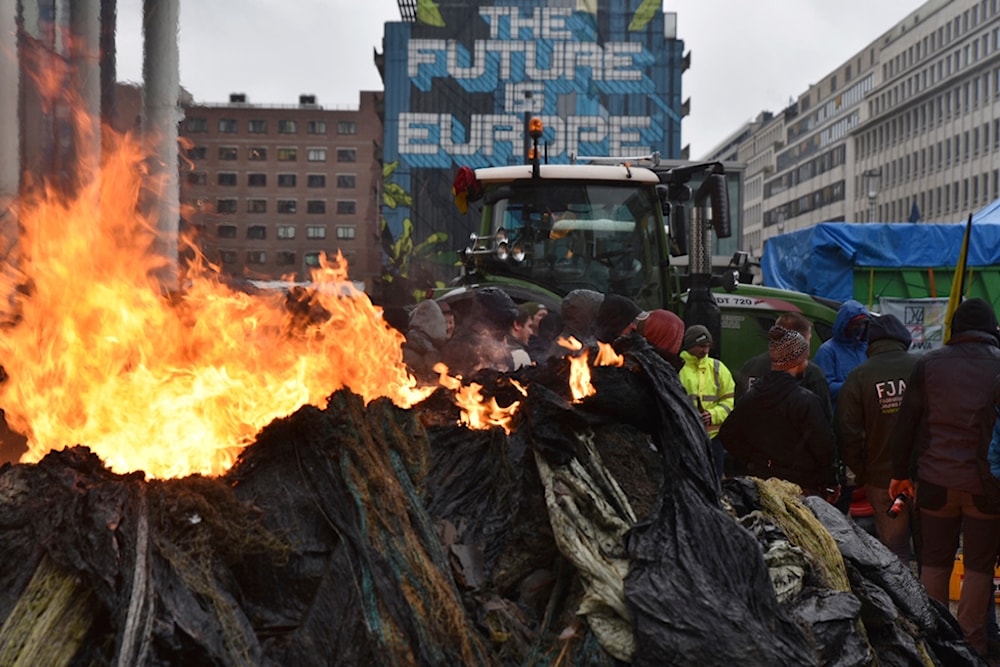Farmers clash with police near Brussels European Quarter
As tankers dumped manure on roads and tractors tore down police barriers, protesters also threw Molotov cocktails at law enforcement officers, leading police to use tear gas to disperse the crowd.
-

Protestors light fires during a farmers' demonstration in the European Quarter outside a meeting of EU agriculture ministers in Brussels, Monday, Feb. 26, 2024 (AP)
Monday saw violent protests as farmers gathered near the European Quarter in Brussels, in an attempt to disrupt a ministerial meeting of the EU countries to discuss agricultural matters, Belgian news sources reported.
According to the Sudinfo.be news portal, protesters were seen throwing eggs at the Lex building near Robert Schuman Square. In another area of the Quarter, demonstrators reportedly dismantled construction barriers and threw them at law enforcement officers.
🇪🇺 New footage of protests in Brussels
— Zlatti71 (@djuric_zlatko) February 26, 2024
The police are trying to fight off the farmers with tear gas and water cannons. There are hedgehogs on the roads, but agricultural machinery easily sweeps them out of the way.
❗️Protesters are trying to break into the European quarter,… pic.twitter.com/fGvTFJoL2H
Tankers were seen dumping manure on roads and tractors tore down police barriers. Protesters also threw Molotov cocktails, which compelled police officers to use tear gas to disperse the crowd.
BRUSSELS.
— Petronilla Husbands (@PetronillaHusb1) February 26, 2024
BELGIUM.
FARMERS PROTEST AND SPREAD SLURRY ON POLICE AS EU HEADQUARTERS SUMMIT OF EUROPEAN AGRICULTURE MINISTERS GETS UNDERWAY AT THE EUROPEAN COMMISSION, THE EXECUTIVE BRANCH OF THE EUROPEAN UNION (EU). IN BRUSSELS pic.twitter.com/SGtbHfJokk
Haystacks were reportedly scattered throughout the entire European Quarter, reports said. Earlier in the day, farmers succeeded in breaking through police barriers at the intersection of Avenue d'Auderghem and Rue Belliard with their equipment. They also ignited a stack of tires, necessitating the use of water cannons by the police to extinguish the flames.
Thousands of farmers besiege the European Union headquarters in Brussels, and the protests escalate throughout Europe.
— Mīkāʾīl (@Grey0973) February 26, 2024
SUPPORT YOUR FARMERS OR WE ALL BE EATING PLANT BASED bs. pic.twitter.com/4csRwxZvsD
Approximately 900 tractors are said to be partaking in the rally organized by the Federation of Agricultural Trade Unions (FUGEA), the Wallonian Agricultural Federation (FWA), the Young Farmers' Federation (FJA), and the European Coordination Via Campesina (ECVC).
Farmers have been protesting across the EU for several compelling reasons, including an agricultural policy perceived as highly restrictive and threatening to normal farming practices. They are calling for several restrictions to be lifted, as well as a halt to the unrestricted entry of competitive foreign goods.
The report noted that Belgian authorities have agreed to hold a meeting with representatives from the Young Farmers' Federation (FJA) following the conclusion of the EU agricultural ministers' meeting.
Read more: Tractors reach Rome as farmer protests sweep Europe
Farmers protest across Europe
A central aspect of farmers' grievances lies in ongoing negotiations between the EU leadership and the Latin American economic alliance Mercosur regarding a possible trade deal, which promises to cause further harm to EU agricultural businesses.
Protests have already taken place in numerous countries, including France, Germany, Italy, Belgium, Poland, Romania and the Netherlands.
Heightened violence has prompted French President Emmanuel Macron to request that negotiations be halted with the South American bloc. However, European Commission spokesman Eric Mamer affirmed that the commission would persist in efforts to reach an agreement aligning with EU sustainability goals and addressing the bloc's concerns in agriculture.
EU-Mercosur trade talks still ongoing
Trade negotiations between the EU and Mercosur go back to 2000, but the talks have been stalled for several reasons, including certain Latin American countries demanding that the EU pay compensation for former years of colonial rule. European agricultural activists have also contributed to the delays due to concerns over price competitivity. Nevertheless, the two economic blocs
Read more: Unwelcomed by angry farmers, Macron spends day at agricultural show
The EU and Mercosur launched negotiations on a trade agreement back in 2000, but the talks soon stalled due to several factors, including demands by Latin American nations that EU countries pay compensation for years of colonial rule, as well as opposition from European agricultural producers, who are concerned about the possibility of price reductions if Brazilian beef enters the market. Despite the challenges, the two blocs succeeded in reaching a political agreement outlining the principles of a comprehensive trade agreement in June 2019.

 3 Min Read
3 Min Read










